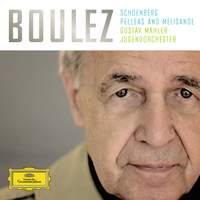Recording of the Week,
Schoenberg and Berg
Pelléas et Mélisande, the Symbolist tale of forbidden love by the Belgian playwright, Maurice Maeterlinck, has inspired music from several composers. Most famous is of course Debussy’s opera, but both Fauré and Sibelius wrote incidental music for productions of the play, and in 1902 the 28-year old Arnold Schoenberg began to compose, at the suggestion of Richard Strauss, a large-scale orchestral tone poem based on the subject. The resulting piece inhabits the same sound world as Gurre-Lieder and the first Chamber Symphony, and was certainly not well-received at its première, with one critic commenting that it “is not just filled with discords … but constitutes in itself a discord lasting fifty minutes …. What else might be concealed behind this cacophony is difficult to guess”.

The problem with the piece, hinted at in that critic’s final sentence, is that it is incredibly tricky to balance properly. With its often dense orchestration, it is very easy for inner detail to get lost amongst the texture, and it takes a conductor with an expert ear to prevent the outbursts from the monster brass section (including eight horns, and five trombones of varying sizes!) from swamping the rest of the orchestra. With this in mind, I don’t think one could ask for a more ideal conductor than Pierre Boulez, directing the Gustav Mahler Jugendorchester in this new live disc. Boulez’s recordings have always impressed me with their clarity, and this one is no exception. While just occasionally I still felt that the brass overwhelmed the climaxes ever so slightly, this is certainly the most successful performance I’ve yet heard on disc, and is a very fine account of this piece indeed.
Works such as this clearly owe a great debt in terms of their harmonic language to late Wagner, and so it is fitting that Boulez has coupled it with the Prelude to Act One from Tristan und Isolde, another tragic tale of doomed lovers. As in the Schoenberg, the tempo is on the whole fairly brisk, but there is no lack of intensity, and it makes for an attractive opening to the disc.

If that leaves you hungry for more music from the so-called Second Viennese School, then you’ll be pleased to hear about a new recording of Alban Berg’s violin concerto from Isabelle Faust (with Orchestra Mozart conducted by Claudio Abbado). Berg had accepted a commission to write a violin concerto just before he was to learn of the death of Alma Mahler’s eighteen-year-old daughter from polio, an event that affected him deeply. He poured all of his emotions into the composition of this piece, resulting in a devastatingly affecting concerto which he dedicated “to the memory of an angel”. It is these elements of tragedy and loss that Faust brings out most effectively in her recording; aside from an extraordinary tone and perfect intonation, you can feel the intent and conviction behind every single note she plays.
As with Boulez, Abbado is a master of orchestral balance; from pianissimo double bass solos to the expertly-voiced clarinet choir that intones the Bach chorale introduced by Berg towards the end of the piece, you can hear all of the tiny details and colours in the score. The orchestral playing is top-notch throughout, including a suitably rasping bass clarinet, warm and tender strings, and a mighty fine pedal C from the tuba about seven minutes into the first movement!
Coupled with the Berg is the violin concerto by Beethoven, which Faust has recorded before with the Prague Philharmonia under Jirí Belohlávek. That earlier recording was first choice for this piece on BBC Radio 3’s Building a Library back in April 2011, and this new one is equally fine. One could possibly argue that Abbado and his players offer an even more refined and stylish accompaniment than their previous counterparts, but there’s really very little in it. Incidentally, for those interested in such matters, Faust does not play the usual Kreisler cadenza, but instead uses her own free adaptation of the one that Beethoven wrote when he himself arranged the piece as a piano concerto.
So, even if you don’t consider Schoenberg and Berg to be your usual listening material, I very much hope that you will give both of these excellent discs a try, as they are well worth exploring. Sound samples for both are available to give you a taste. Enjoy!
Gustav Mahler Jugendorchester, Pierre Boulez
Available Formats: MP3, FLAC
Isabelle Faust (violin), Orchestra Mozart, Claudio Abbado
Available Formats: MP3, FLAC, Hi-Res FLAC




